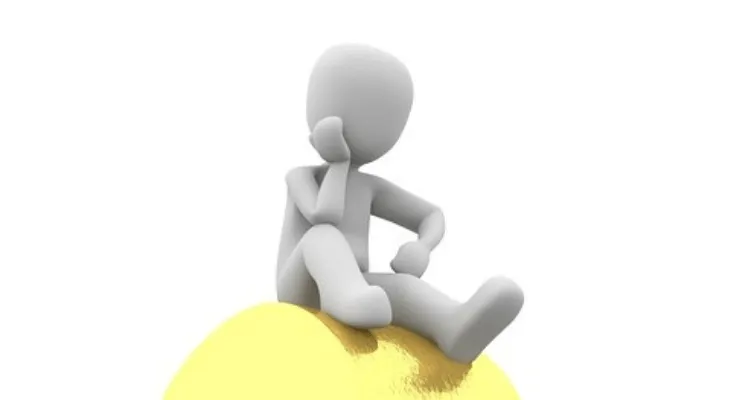
This post has been mostly inspired by a comment that was left on my feed last week, which was in the context of the advances seen in the understanding of mental health issues. The comment contained an observation of how over the past decade progress seems a far-fetched notion when it comes to depression, and how only a change in life-style can truly tackle this seemingly ubiquitous problem.
I then thought it would be interesting to discuss with you, about some aspects of life that tend to bring people down, and oftentimes even lead them to a state of depression. And, from there, discuss how aspects that weigh us down to the point of paralyses can be objectively examined and, subsequently, replaced by perspectives that clear the way for a renewed mindset and approach to life which sparks a more hopeful, positive outlook towards the self.
The aspect we’re going to discuss today is: guilt.

The cambridge.org dictionary definition of guilt is the following:
A feeling of worry or unhappiness that you have because you have done something wrong, such as causing harm to another person.
Before we delve into the main focus of this post, I’d like to quickly mention that there are individuals out there who tend to feel guilty even without having caused any harm to others.
Cognitive Distortion: Inaccurate thoughts that prompt distress and angst.
That’s why the above definition helps me to go straight into the heart of the matter:
When You’ve Done Something Wrong.

Whenever we are faced with this realisation it feels as if a little devil suddenly took seat on our shoulder and began to whisper in our ear: ”you’re a bad person”. And here is an interesting thing, while there are individuals who aren’t eve fazed by having upset someone, there are those who’ll attach this notion of badness to the very core of who they are, and inadvertently step into an existence of anxiety, shame and feelings of inferiority.
Generally, anxiety stems from the fear of retaliation. Like Ben, who was found having an affair and is now afraid that his partner will pay back with the same coin. Shame - due to the concern that others see you as a lesser person after your mistaken action became known. Similar to Cindy, a young lady who pocketed the money of a sale in the Bed & Breakfast where she works, but was filmed by the security camera. And finally, the sense of inferiority which results from the rationale: “if I did such thing, I am an inferior person”.
Now, we all agree that both betraying a life partner and stealing are inappropriate, hurtful behaviours. Something which Ben and Cindy wholeheartedly acknowledge. In these cases what normally happens next is that the person who’s being consumed by guilt believes that they then deserve to suffer. I believe this sort of thinking has its roots in sociocultural values. As if, the only way a person has to show accountability for their wrongdoings is through suffering. As if the fetters of guilt are the only means to restrain people from acting immorally and impulsively.
Still, if guilt is the punishment you assigned to yourself in order to pay for your offence. The obvious questions to ask are: how long is the sentence for? 30 years? 3 years? Most importantly, once you’ve served your time will you be prepared to end your self-inflicted suffering and move on? Or, are you going for a life-time sentence? Why?
Regret Vs. Guilt.
My main objection towards this sort of attitude is that it fails to foster a fruitful existence.
Buddhism distinguishes regret/repentance from guilt. The cognitive behavioural approach elucidates this distinction by explaining that regret is linked to behaviour, whilst guilt aims at the self [2]. Something which, consequently, results in a cycle of negativity that is inadvertently created when this self-defeating emotion sets in.
It looks pretty much like this:

This cycle builds a convincing case towards one’s “badness”, which further reinforces guilt and consequently self-inflicted suffering. It drives you to analyse your emotional and psychological state as a judge, but one who does not care for acquittal or mitigation.
To make matters worse, the underlying belief that you are “no good” only promotes further bad behaviour by means of counterattacks and defensiveness. Think about it. You have labelled yourself guilty, now it’s only natural you’re constantly on the defence: shielding yourself from criticism and growing even more insecure about your shortcomings. It’s not a surprise that the emotional chaos brought by guilt can paralyse people into a depressive state. It’s undoubtedly overwhelming.
From Judge to Detective.

Nevertheless, this is not the only way one has to address the errors one inevitably makes in life. One thing psychologists like to say to clients when they talk about their angst is that rather than viewing their emotional distress from the standpoint of a mean judge, view it as a detective! Take on the case and search for information, for evidence. With objectivity.
Embrace the sadness elicited by the regret of your wrong actions (not your wrong self ). And begin the investigative inquiry with the aim to: (1) acknowledge the mistake, (2) learn from it, and (3) implement changes.
In general, people refrain from acknowledging the mistakes they make because it causes them sadness. Sadness is a most aversive feeling, especially in Western societies. Hence, whatever circumstance may bring this emotion about it’s just left to be dealt with “later”.
Further, irrespective of the magnitude of our errors when looked through the lens of guilt, they make us appear evil. This is a disturbing realization. Those were precisely Cindy’s words: “I’m evil for stealing”. But Cindy also felt deeply sad and ashamed for her behaviour.
While stealing might be an “evil” action it falls short from defining Cindy’s true self. A self she discovered to be deeply thoughtful and humane because of the very sadness she allowed herself to feel as a consequence of her wrongdoing. The evil label, subsequently, became no longer suitable. Then, Cindy began to see herself with love and respect. A renewed self-perception that greatly facilitated the development of strategies for making amendments.
Which is precisely what Ben did. After he let his guard down (due to a newly acquired self-perception) he was able to recognise the extent of the pain his actions caused to his long-term partner. After understanding that despite putting their relationship at risk he is no monster. Only then he was able to apologise for his indiscretion (rather than give excuses for it), explain himself and, finally, communicate his insecurities as well as willingness to move forward.
Cindy learnt that she needed to get her finances in order and not put herself in a position where she is so tight for money that her desperation clouds her good judgement. And Ben realised that being honest about how lonely he’d been feeling lately actually made his partner feel wanted, and not harassed.
So, just in case you need to embark on a similar investigation, here are some questions that can help you with your detective work ➙ ✦ Am I judging my self or scrutinising my actions? ✦ Have I learnt from my wrongdoings, or am I simply ruminating in a self-defeating way? ✦ Am I prepared to let my guard down, and take responsibility for the hurt my behaviour has caused? ✦ How has this contributed to my personal growth?
Promoting Psychological Well-Being.
One of the primary causes of psychological issues stem from our tendency to avoid dealing with our inner problems. Sometimes, we even naively hope that our personal-issues will just: puff, magically disappear. Then, we go on living with the inevitable distress that comes with hosting undealt-with dilemmas. Whenever truth or reality is painful, we tend to avoid it. But, anyone who is seeking peace and psychological freedom can confront their inner-problems if they’re prepared to put in the time.
This might be just the change we all need to implement in our lifestyle in order to maintain our mental-health in good shape. Remember, psychological well-being results from an ongoing process of dedication to the self. In case feelings of shame or sadness arise along the way. Well, just let them be. They are evidence of your humanity, of the thoughtfulness and compassion that reside within you. They give you reasons for which you should love and respect yourself. And subsequently, gather the strength to cast guilt away.
The name (and some details) of the individuals featuring here have been changed in order to protect their privacy.
Image source: 1, 2, [3] - Created by me on Word,4
Reference List:
1,2 Beck, J. S. (2011), Cognitive Behaviour Therapy – Basics and Beyond, New York – London, The Guilford Press.
Peck, M. S. (1978). The road less travelled: A new psychology of love, traditional values, and spiritual growth, New York, Simon and Schuster.
Gethin, R. (1998) The foundations of Buddhism, Oxford - New York, Oxford University Press.


Thank you my dear reader. For taking the time to engage in some self-reflection with me :)
I wish you all the best, always.